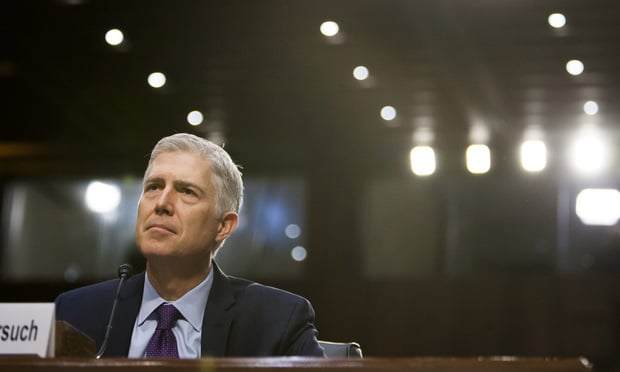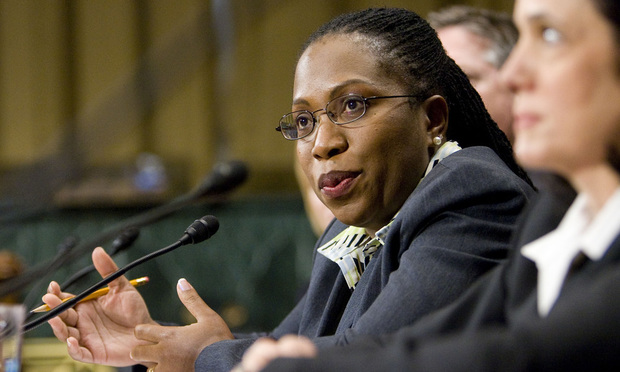Gorsuch and Thomas Decry 'Chaos' of National Injunctions, as Judges Check Trump
"What in this gamesmanship and chaos can we be proud of?" Justice Neil Gorsuch, joined by Justice Clarence Thomas, asked. Last year in an unrelated case, a Washington federal trial judge said the Trump DOJ's crusade against national injunctions "reeks of bad faith" and "demonstrates contempt for the authority that the Constitution's Framers have vested in the judicial branch."
January 27, 2020 at 03:24 PM
5 minute read
 Neil Gorsuch testifies before the Senate Judiciary Committee in 2017. Photo: Diego M. Radzinschi / NLJ
Neil Gorsuch testifies before the Senate Judiciary Committee in 2017. Photo: Diego M. Radzinschi / NLJ
Justice Neil Gorsuch, joined by Justice Clarence Thomas, on Monday sharply criticized the use of nationwide injunctions and urged the U.S. Supreme Court "at the appropriate juncture" to review what they contend are constitutional questions raised by their use.
"This is not normal," Gorsuch said, after describing how federal trial judges around the country were approving or declining to grant injunctions in challenges to a new Trump administration immigration rule that would redefine criteria for who can be deemed to be dependent on federal benefits.
"What in this gamesmanship and chaos can we be proud of?" Gorsuch asked.
The divided Supreme Court—with Justices Ruth Bader Ginsburg, Stephen Breyer, Sonia Sotomayor and Elena Kagan in dissent—on Monday allowed the Trump administration to challenge a New York trial judge's order, while letting the new regulation temporarily take effect. The case is U.S. Department of Homeland Security v. New York.
The debate over the use of nationwide injunctions has been ongoing for more than two years, fueled in large part by trial and appellate judges blocking controversial new Trump administration policies. Former U.S. Attorney General Jeff Sessions and his successor, William Barr, have inveighed publicly against them several times.
It was Thomas who first raised doubts in the Supreme Court about the constitutional and equitable underpinnings of injunctions that thwart the national implementation of a policy. In a concurring opinion in the travel ban case, Trump v. Hawaii, Thomas questioned whether district judges have the authority to issue nationwide injunctions.
"These injunctions did not emerge until a century and a half after the founding," Thomas asserted. "And they appear to be inconsistent with longstanding limits on equitable relief and the power of Article III courts. If their popularity continues, this court must address their legality."
U.S. solicitor general Noel Francisco had asked the justices in the travel ban case to examine nationwide injunctions, but the high court did not take up the issue. Thomas was alone in the high court in his concurrence and in voicing his skepticism until the Gorsuch concurrence.
Gorsuch used Monday's order in the "public charge" immigration case to convey his views on nationwide injunctions.
"As the brief and furious history of the regulation before us illustrates, the routine issuance of universal injunctions is patently unworkable, sowing chaos for litigants, the government, courts, and all those affected by these conflicting decisions," Gorsuch wrote. "Rather than spending their time methodically developing arguments and evidence in cases limited to the parties at hand, both sides have been forced to rush from one preliminary injunction hearing to another, leaping from one emergency stay application to the next, each with potentially nationwide stakes, and all based on expedited briefing and little opportunity for the adversarial testing of evidence."
Defenders of nationwide injunctions contend they are in some cases "the only means to provide plaintiffs with complete relief, or to prevent harm to thousands of individuals similarly situated to the plaintiffs who cannot quickly bring their own cases before the courts," as Amanda Frost of American University Washington College of Law wrote in a 2018 article. She added: "Sometimes anything short of a nationwide injunction would be impossible to administer."
 U.S. District Judge Ketanji Brown Jackson in D.C. Photo: Diego M. Radzinschi/ NLJ
U.S. District Judge Ketanji Brown Jackson in D.C. Photo: Diego M. Radzinschi/ NLJLast September, a Washington federal trial judge said the Trump Justice Department's move to restrict nationwide injunctions "reeks of bad faith."
"It reeks of bad faith, demonstrates contempt for the authority that the Constitution's Framers have vested in the judicial branch, and, ultimately, deprives successful plaintiffs of the full measure of the remedy to which they are entitled," U.S. District Judge Ketanji Brown Jackson of the District of Columbia said in a ruling.
A recent law review article from Mila Sohoni, a former Jenner & Block associate who clerked for Judge Judith Rogers on the U.S. Court of Appeals for the D.C. Circuit, pushed back at critics of nationwide injunctions who contend they do not have a long history in the law.
"Injunctions that shielded nonparties formed at least a part of the output of the federal courts as far back as 1913, and that even before then—in the 1890s—the [Supreme] Court understood a lower federal court 'sitting in equity' as empowered to offer a 'comprehensive decree covering the whole ground of controversy' that would 'determine once for all' the legality of a state law for 'the entire community,'" Sohoni wrote.
Read more:
Circuits Split and Judges Squabble as Courts Confront National Injunctions
'Reeks of Bad Faith': DC Judge Scolds Trump DOJ's Drive to Restrict Injunctions
Clarence Thomas, Alone, Asserts National Injunctions Are 'Historically Dubious'
DOJ Policy Head Scolds 'Dogged Determination' to Enjoin Trump Administration
U.S. Appeals Judge: Don't End Nationwide Injunctions. (But Here's a Plan for Them.)
This content has been archived. It is available through our partners, LexisNexis® and Bloomberg Law.
To view this content, please continue to their sites.
Not a Lexis Subscriber?
Subscribe Now
Not a Bloomberg Law Subscriber?
Subscribe Now
NOT FOR REPRINT
© 2025 ALM Global, LLC, All Rights Reserved. Request academic re-use from www.copyright.com. All other uses, submit a request to [email protected]. For more information visit Asset & Logo Licensing.
You Might Like
View All
11th Circuit Rejects Trump's Emergency Request as DOJ Prepares to Release Special Counsel's Final Report
3 minute read
4th Circuit Revives Racial Harassment Lawsuit Against North Carolina School District
3 minute read
Fenwick and Baker & Hostetler Add DC Partners, as Venable and Brownstein Hire Policy Advisers
2 minute read
DOJ, 10 State AGs File Amended Antitrust Complaint Against RealPage and Big Landlords
4 minute readTrending Stories
- 1iRobot Picks Up Law Firm Partner as New Legal Chief
- 2Baker McKenzie Spins Off AI-Powered Risk Management Tool SCOREalytics as Independent Business
- 3Edison Hit With Lawsuits Over Devastating Eaton Fire in Los Angeles
- 4Does Society’s Focus on Children’s Sexuality Make Them Vulnerable to Grooming?
- 5California Lawmakers Reach $50M Deal to Fund Legal Fights Against Trump
Who Got The Work
Michael G. Bongiorno, Andrew Scott Dulberg and Elizabeth E. Driscoll from Wilmer Cutler Pickering Hale and Dorr have stepped in to represent Symbotic Inc., an A.I.-enabled technology platform that focuses on increasing supply chain efficiency, and other defendants in a pending shareholder derivative lawsuit. The case, filed Oct. 2 in Massachusetts District Court by the Brown Law Firm on behalf of Stephen Austen, accuses certain officers and directors of misleading investors in regard to Symbotic's potential for margin growth by failing to disclose that the company was not equipped to timely deploy its systems or manage expenses through project delays. The case, assigned to U.S. District Judge Nathaniel M. Gorton, is 1:24-cv-12522, Austen v. Cohen et al.
Who Got The Work
Edmund Polubinski and Marie Killmond of Davis Polk & Wardwell have entered appearances for data platform software development company MongoDB and other defendants in a pending shareholder derivative lawsuit. The action, filed Oct. 7 in New York Southern District Court by the Brown Law Firm, accuses the company's directors and/or officers of falsely expressing confidence in the company’s restructuring of its sales incentive plan and downplaying the severity of decreases in its upfront commitments. The case is 1:24-cv-07594, Roy v. Ittycheria et al.
Who Got The Work
Amy O. Bruchs and Kurt F. Ellison of Michael Best & Friedrich have entered appearances for Epic Systems Corp. in a pending employment discrimination lawsuit. The suit was filed Sept. 7 in Wisconsin Western District Court by Levine Eisberner LLC and Siri & Glimstad on behalf of a project manager who claims that he was wrongfully terminated after applying for a religious exemption to the defendant's COVID-19 vaccine mandate. The case, assigned to U.S. Magistrate Judge Anita Marie Boor, is 3:24-cv-00630, Secker, Nathan v. Epic Systems Corporation.
Who Got The Work
David X. Sullivan, Thomas J. Finn and Gregory A. Hall from McCarter & English have entered appearances for Sunrun Installation Services in a pending civil rights lawsuit. The complaint was filed Sept. 4 in Connecticut District Court by attorney Robert M. Berke on behalf of former employee George Edward Steins, who was arrested and charged with employing an unregistered home improvement salesperson. The complaint alleges that had Sunrun informed the Connecticut Department of Consumer Protection that the plaintiff's employment had ended in 2017 and that he no longer held Sunrun's home improvement contractor license, he would not have been hit with charges, which were dismissed in May 2024. The case, assigned to U.S. District Judge Jeffrey A. Meyer, is 3:24-cv-01423, Steins v. Sunrun, Inc. et al.
Who Got The Work
Greenberg Traurig shareholder Joshua L. Raskin has entered an appearance for boohoo.com UK Ltd. in a pending patent infringement lawsuit. The suit, filed Sept. 3 in Texas Eastern District Court by Rozier Hardt McDonough on behalf of Alto Dynamics, asserts five patents related to an online shopping platform. The case, assigned to U.S. District Judge Rodney Gilstrap, is 2:24-cv-00719, Alto Dynamics, LLC v. boohoo.com UK Limited.
Featured Firms
Law Offices of Gary Martin Hays & Associates, P.C.
(470) 294-1674
Law Offices of Mark E. Salomone
(857) 444-6468
Smith & Hassler
(713) 739-1250










